April 4-7, 2005—New Orleans, Lousiana

Seminars
- Ecumenism 101
Presenter: The Rev. Lydia Veliko
A seminar designed for the newcomer to the National Workshop on Christian Unity, or to ecumenism in general. While this seminar does not presuppose background in the ecumenical movement, it acknowledges that nearly everyone has a wealth of experience to share in the area of ecumenical relationships. This seminar will attempt to answer the question, “Where are we today in the ecumenical movement?” Group interaction will be encouraged.
- The Roman Catholic Church, Ecumenism & the African American Experience
Presenters: Sr. Eva Regina. Martin, SSFD, Dr. Jamie Phelps, the Rev. Dr. Dwight Webster & Dr. Ronald Dorris
This session is a three-pronged presentation on the history of African American Catholics in Louisiana, the importance of ecumenism as it relates t the Black Catholic experience; and, examples of collaboration and dialogue that have existed and continues to persist among protestant pastors and parishioners of various traditions and the Black Catholic community.
- Rapture, the Middle East “Left Behind” Series
Presenter: Dr. Barbara Rossing
God and religion are top-sellers in the pop culture mainstream, yet the most popular novels raise troubling consequences for public theology– especially regarding Israel and Palestine. Drawing on her book, “The Rapture Exposed: the Message of Hope in the Book of Revelation,” featured in April 2004 on Sixty Minutes II (“The Greatest Story Ever Sold”), Rossing will critique the violent rhetoric and rapture of politics in our culture. She will trace the origins of rapture theology, challenging proponents’ claims of a literal interpretation of Daniel, Revelation and other biblical texts. She will offer a model for seeing Scripture coming to life not in global disasters or in the Middle East wars but in “Lamb Power” –the power of Jesus’ nonviolent, self-giving love for the world –a world that will not be left behind!
- Lutheran/Roman Catholic Koinonia –Structure of Ministry
Presenter: Dr. Susan Wood
Round ten of the Lutheran Roman Catholic dialogue ended April, 2004 and issued its document, “The Church as Koinonia of Salvation: Its Structures and Ministries.” Dr. Wood will explain the logic of the argument and its implications for both churches.
- Mary –ARCIC
Presenters: Sr. Sara Butler & Dr. E. Rozanne Elder
In 2004 the Anglican-Roman Catholic International Commission concluded an Agreed Statement on Mary in the Church’s faith. Rather than focus on the dogmas of the Immaculate Conception and the Assumption, which are mentioned in an earlier ARCIC Agreed Statement as problematic for Anglicans, the Seattle Statement surveys the Scriptural and theological tradition common to the two churches. As a result, ARCIC has been able to set out points of agreement on “the place of Mary in the economy of hope and grace” and to take a promising, fresh approach to questions which have been communion-dividing.
- Christian Basis for Interreligious Dialogue
Presenters: Fr. Francis V. Tiso, Ph.D., & Dr. Shanta Premawardhana
We will explore with Protestant and Catholic scholars the biblical and theological basis for Interreligious relationships through official, ecclesial statements and church traditions. The concern focus will be a theologyof Interreligious dialogue that is recognizably Christian, for the benefit of Christians as they begin to discover that they have much to learn from other religions. Fr. Francis Tiso, Associate Director, Secretariat for Ecumenism and Interreligious Affairs of the USCCB will summarize historical and current materials from the overarching perspective of Nostra Aetate. Dr. Shanta Permawardhana, Associate General Secretary for Interreligious Relation NCCUSA, will explore the NCCUSA’s Policy Statement on Interfaith Relations, as well as other statements on Interreligious relationships from the Ecumenical
Movement.
- “Love for the Poor”
Presenters: Dr. Beverly Mitchell & Dr. Shaun CaseyThis seminar will explore the convergence text “Love for the Poor” prepared by the Faith and Order office of the National Council of the Churches of Christ in the U.S.A. and faculty of the Washington Theological Consortium, representing Evangelical and Catholic perspectives as well as those of NCC-member communions. This session will consider the relationship between spirituality and justice in the life of Christian communities and explore the biblical and theological foundations for the churches’ stand on economic justice with particular reference to patristic foundations for practical present-day applications.
- CUIC: Ministerial Unity & African American Methodists
Presenters: Bishop Marshall Gilmore & The Rev. Herman HarmelinkAs we move towards reconciliation of members and ministries, member churches have a number of issues or concerns which require resolution. In particular, the three predominantly African American Methodist Episcopal Churches raise concerns about racism, true equality and full acceptance of existing episcopates.
- Religious Rhetoric
Presenter: Dr. Robert Schreiter, C.P.P.S.Since September 11, 2001 the language and general environment of life in the United States has taken on a sharper divisive, either-or, with-me-or-against me character. This is also reflected in many of the internal battles within the churches as well. This workshop begins with a description and analysis of this increasingly strident environment of life in the United States, and looks at some of the strategies that might create a more communal and reciprocal mode of speaking and acting. Work going on in reconciliation and rebuilding shattered communities will be drawn upon for possible models for action.
- Progress & Potholes on the Road to Unity: Updates & Obstacles
Presenter: The Very Rev. William H. Petersen, Ph.D., D.D.
This workshop will be concerned to present updates, principally in bi-lateral ecumenical conversations, but with some notice of multi-laterals. The spectrum of goals from “mutual understanding” to “reconciliation of differences” to “full communion” will be considered with attention to national, regional, and in some cases, global perspective. In addition, the appearance of new causes of hesitation, obstacles to unity, and division between and within ecclesial communities will be examined. Discussion will focus on the elements necessary to meet these new challenges.
- Restorative Justice
Presenter: The Most Rev. Alfred C. Hughes
In the parable of the Great Judgment, the words: “Come, O blessed of my Father, inherit the kingdom prepared for you. . . [for] I was in prison and you came to me.” The principles of Restorative Justice offer much more than a program for the reform of America’s criminal justice system. The Catholic Bishops of Louisiana in their own adaptation of the US Bishops’ statement are seeking reform of the criminal justice system that we believe has implications for our common ministry in Jesus Christ.
- Local Ecumenical Ministry “Best Practices”
Presenter: The Rev. Jeff Day
“On Keeping the ‘You’ in Local Ecumenical work”–Local ecumenical work requires the cooperation of persons, churches and encouragement of judicatories to begin and nurture a local ecumenical effort. To paraphrase a statement well known in political circles, all ecumenical work is (ultimately) local. The seminar participants will hear stories of how local ecumenical and interfaith ministry began in Baton Rouge, LA 18 years ago. A lively sense and presence of the Lord’s Prayer emphasis on “thy kingdom come. . .” is the start of looking locally for what churches need to be about in working together. Examples of discovering the “best beliefs and best practices” for meeting local human needs will be one feature of the workshop. Sustaining a local ecumenical work will be the second part of the workshop. Funding needs and finding volunteers, discovering how beliefs, best practices and developing enthusiastic supporters, how all of these may come together to demonstrate that we may accomplish more by working together than working along, will be our goal.
- Ezekiel 34 Project–A Statewide Ecumenical Initiative
Presenters: Mr. Rob Gorman & Mr. Mark Davis
There are few biblical images used more frequently than water. It is the moral responsibility of the religious community to take a leadership role in the stewardship of Louisiana’s coastal wetlands and waters. The Commission on Stewardship of the Environment was formed in 1987 as part of the Louisiana Interchurch Conference. The LIC holds that providing clean, safe water and preserving and restoring our wetlands is a fundamental moral responsibility both form an environmental stewardship perspective and as a mater of social justice to ensure the health and safety of Louisiana citizens, especially our poorest people.
- Developing a Younger Generation of Ecumenical Leaders
Presenters: Jason Renken, A. J. Boyd, Melanie Gibbons
How do churches encourage participation in the ecumenical movement for laypersons and clergy in their 20’s and 30’s? What motivates this generation of active Christians to respond enthusiastically to Christ’s prayer “that all may be one?” Coming from a variety of ecumenical experiences, this panel will discuss these and other questions related to the formation of the next generation of ecumenical leaders.
Presenters
Reverend Dr. Delores Carpenter
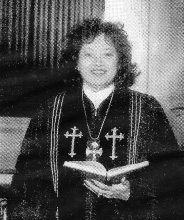
Reverend Dr. Delores Carpenter is Professor of Religious Education at Howard University School of Divinity. She has also served as the first woman Senior Pastor of Michigan Park Christian Church (Disciples of Christ) in Washington, DC for 19 years. She has earned a Bachelor of Arts Degree from Morgan State University, summa cum laude; a Master of Divinity Degree from Howard University School of Divinity, cum laude; a Masters of Arts Degree from Washington University; and a Doctor of Education degree from Rutgers University. Her dissertation “The Effects of Sect-Typeness Upon the Professionalization of Black Female M.Div Graduates” was accepted without changes. She was the first recipient of the Samuel Proctor Award from Rutgers University. In 1962, she was the first woman ordained by the Progressive Freewill Baptist Conference of Baltimore, Maryland. In 1996, she earned the Mother of the Year for the District of Columbia American Mothers, Inc. Award.
Dr. Carpenter was the first woman Dean at Essex County College in Newark, New Jersey. Before beginning a career in higher education, she worked for the Young Women’s Christian Association (YWCA) in Washington, DC, and Fellowship Center in St. Louis. In 1994, she was among the first seven women ever listed in Ebony’s honor roll of the greatest black preachers in America. In 1997, she was featured as one of the fifteen greatest black women preachers in America. In addition to serving as the Director for The Commission for Ministry for the Christian Church Capital Area (Disciples of Christ), she holds honorary Doctorate of Divinity degrees from Lynchburg College and the Southern California School of Ministry. She is the mother of two very accomplished daughters, Jane and Susan Carpenter.
Richard J. Sklba
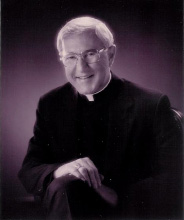
Richard J. Sklba was born in Racine, Wisconsin, on September 11, 1935. Baptized at Holy Trinity Parish, he attended public elementary school outside the city of Racine. Bishop Sklba spent two years at St. Catherine High School in Racine before transferring to St. Francis Minor Seminary in Milwaukee to finish high school and begin his college education. From 1954 to 1960 he studied in Rome, completing his undergraduate studies and receiving his first of three advanced degrees in scripture in 1960 he was ordained and became assistant pastor of St. Mary’s Parish in Elm Grove for two years. He returned to Rome from 1962 to 1965 to complete the equivalent of a master’s and doctorate degree in sacred scripture at the Pontifical Biblical Institute and the University of St. Thomas Aquinas “Angelicum.” For the next 11 years, he provided weekend pastoral service to St. Veronica Parish in Milwaukee and taught scripture at St. Francis Seminary in Milwaukee.
Bishop Sklba was one of America’s younger bishops when ordained on December 19, 1979 and has been appointed to many different committees of the National Conference of Catholic Bishops. Active in the area of interfaith ministry, the bishop is presently a consultant for the Committee for Ecumenical and Interfaith Affairs. He is also the co-chair of the National Evangelical Lutheran/Catholic Dialogue. Bishop Sklba was elected diocesan administrator by the Archdiocesan College of Consultors on May 24, 2002.
Paul N. Anderson
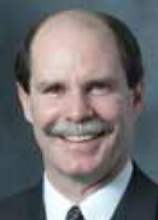
Paul N. Anderson serves as Professor of Biblical and Quaker Studies at George Fox University, where he has taught since 1989. In addition, he served as a pastor among Friends for seven years and has been involved in a variety of interdenominational and interdisciplinary ventures. Paul served on the NCCC Faith and Order Peace and Scripture consultations in the 1990’s and has participated in the Faith and Order Commission for the last three years. He served as Editor of the Evangelical Friend from 1990-1994, and has served as editor of Quaker Religious Thought since 2000. His book, The Christology of the Fourth Gospel has received international engagement, and Paul is a founding member of the SBL Consultation: “John, Jesus, and History.” Paul is the Director of the George Fox University Congregational Discernment project (discernment.georgefox.edu) and was commissioned to respond to Pope John Paul II’s letter on Petrine Ministry by the NCCC Faith and Order Commission. He grew up in Latin America and received his Ph.D. at the University of Glasgow.
Carol Joy W.T. Gallagher

Carol Joy W.T. Gallagher was born in San Diego, CA on December 24, 1955 to the Rev. Donald K. and Elizabeth Ann WalkingStick Theobald. She received her BA from Antioch College in 1976 and her MDiv from the Episcopal Divinity Seminary in 1989 and MTh from Princeton Theological Seminary in 1998. She is currently a doctoral candidate at the University of Delaware in the area of Urban Affairs and Public Policy. Her dissertation topic concerns Native Leadership in the Episcopal Church.
The Rt. Rev. Gallagher is the first American Indian (Cherokee) female bishop in the Episcopal Church, the first indigenous female bishop in the worldwide Anglican Communion and the first female bishop in the three Episcopal dioceses in Virginia. Bishop Gallagher’s Native American heritage comes through her mother, Betty WalkingStick Theobald. Her great-great-great grandmother walked the Trail of Tears from North Carolina to Oklahoma in the 1830’s. Her father was a Presbyterian minister for 52 years at the time of his death in 1994. Bishop Gallagher is married to Mark Paul Gallagher. They have three children: Emily, Ariel, and Phoebe. She loves to sing and plays several instruments.
Summary
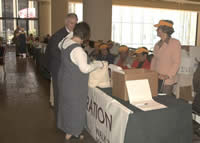
The 2005 National Workshop on Christian Unity was held at the Sheraton New Orleans, located only a few blocks from the famed French Quarter.
Over 325 Delegates, from all the major denominations that are engaged in Ecumenical efforts, took part in the events which oppened with Worship on Monday, April 4rth.
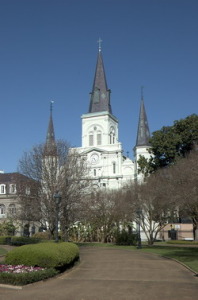
The Opening Worship service was held at 7:00 p.m. in the historic Cathedral of St. Louis. The Rev. Delores Carpenter, Disciples of Christ delivered an impassioned, sermon to the nearly packed cathedral. Music was provided by the Dillard University Choir.
The Keynote Address (sponsored by the Order of St. Lazarus) Keynote Speaker for the National Workshop on Christian Unity was Bishop Richard J. Sklba (Catholic Auxiliary Bishop of Milwaukee). In the Tuesday morning address, he spoke on the theme: From Dialogue to Reconciliation. He challenged the churches to make real the reconciliation we have already experienced, saying “The goal is not to return but to move forward.” “Reconciliation must begin with conversion,” he said. Bishop Sklba, shown in photo to the right, called us to be partners in the proclamation of the gospel, not rivals. He said our task for moving forward are: Understanding, Cooperation, Participation, Openness and Sharing the Pain.
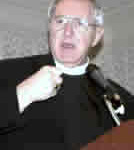
Following the Keynote Address partipants went to breakout rooms where Seminars on a dozen topics took place, such as Ecumenism 101 (The Rev. Lydia Veliko), Rapture, the Middle East “and Left Behind Series (Dr. Barbara Rossing) and Restorative Justice (The Most Rev. Alfred Hughes).
The Afternoon was devoted to workshops sponsored by the various Network Groups (EDEO, NADEO, LEARN & ECCO. During the evening, there was a Catholic Eucharist celebrated at St. Mary’s Church and a joint Lutheran and Episcopal Eucharist at Christ Church Cathedral.
On Wednesday Morning the participants gathered to take part in an Bible Study led by Dr. Paul Anderson, Professor of Biblical and Quaker Studies at George Fox University. In the Bible Study he spoke on the topic From Partisanship to Partnership.
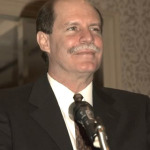
Dr. Anderson noted the polarities of Corinthians 3:1-23. He said that the Corinthians got it wrong, and could the church get it any better now. He showed how Paul deconstructed the partisanships and reconstructed the community on the basis of a collaborative model for the church. We need to support one another, even when what the other does seems to be in competition with what we are doing.
He turned then to the treatment of Spiritual gifts, saying that it is not important that they be sensational, but treats as most important those that build up the community. The Holy Spirit gives gifts in terms of what the church needs, rather than what we want.
The remainder of the morning was spent in seminar sessions as detailed above.
Wednesday afternoon attendees took part in a variety of workshop experiences and at 5 pm, a large number of the attendees took part in a CUIC (Churches Uniting in Christ) Eucharistic Service at the Church of the Immaculate Conception.
The evening featured a social event held at Mardi Gras World.
Thursday morning again began with Morning Prayer led by a priest of the Coptic Orthodox Diocese of the Southern U.S.A.
Dr. Paul Anderson then continued the Bible study to the gathered NWCU attendees. Effective Christian Leadership involves facilitating the attending, discerning and the minding of Christ’s Leadership of the Church.
He talked about the skills necessary to carry out this task. He stressed the importance of listening for this process. Do we use our listening skills to attend to what God may be saying to us in worship or are we too preoccupied in the doing of worship rather than the experience of worship? How do we attend to God?
He then turned to discernment, speaking to both issues of individual and corporate discernment. He discussed the role of scripture, tradition, and reason in the process of personal discernment. Corporate discernment can be illustrated by the difference of a business meeting, opened with prayer, and a worshipful time during which we offer up our work as an act of worship.
Again, the participants went from the Bible Study to attend the Seminar sessions.
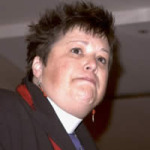
Following the seminar time, the NWCU held its closing session and luncheon. The speaker for the closing session was Bishop Carol Gallagher, the first Native American woman to be a Bishop in the Episcopal Church in the United States.
Among the issues Bishop Gallagher addressed was the manner in which Christian Churches encouraged the abandonment of Native American traditions as being incompatible with the Christian Faith, rather than using many of those traditions to enrich the Christian Community.
The Thursday Luncheon was the closing event of the 2005 NWCU.
